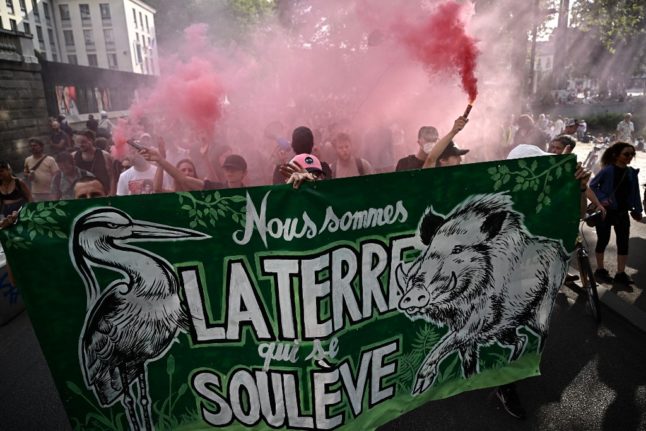Interior Minister Gérald Darmanin ordered that the Uprisings of the Earth group – known as Soulèvements de la Terre (SLT) in French – should be dissolved in June, following violence clashes at a site in western France in March.
But on Friday, in a summary ruling the Conseil d’Etat said, “the dissolution of the Earth Uprisings undermines the freedom of association and creates an emergency situation for the applicants”, which is why the judges consider “that the first condition necessary to order the suspension is fulfilled”.
The full judgement will come later in the year.
⚖️ Le Conseil d’État suspend en référé la dissolution des Soulèvements de la Terre
➡️ Lire la décision : https://t.co/PpLJphhK6f pic.twitter.com/uO1nFny7Jx
— Conseil d'État (@Conseil_Etat) August 11, 2023
READ ALSO Can French ministers ban activist groups?
The court said that the Interior Ministry of the Interior had not provided sufficient evidence to attest to the legality of this decree, which was nevertheless adopted by the Council of Ministers on June 21st.
“Neither the documents in the file, nor the exchanges during the hearing, allow us to consider that the collective endorses in any way violent acts towards people,” the Conseil said in an official press release.
But SLT’s victory may be short lived, as the decision is not a final judgement. It merely suspends the dissolution ordered by the government on June 21st. The judges still have to decide on the merits, “probably in the autumn”.
SLT is part of a new wave of radical climate activist groups, including Extinction Rebellion, that say direct action is needed in response to insufficient efforts to combat climate change and global warming.
The dissolution procedure was launched in March after around 5,000 protesters battled with more than 3,000 police officers during a protest against a giant irrigation reservoir near Sainte-Soline in western France.
Two protesters were left in a coma, and around 30 officers were injured.
But Darmanin has drawn fire from left-wing opponents and rights groups for branding the actions of some protesters “eco terrorism”, noting that SLT’s dissolution was based on a law targeting extremist ideologies.
“It should not be used in a context of civil disobedience, where the freedom of expression and assembly takes precedence,” Greenpeace France said in a statement.
Greenpeace added that it would support Soulèvements de la Terres if it contested the dissolution decree before the Conseil d’Etat, which rules on the legality of French laws.
It was joined in its support of the group by numerous associations and parties, including EELV, Agir pour l’environnement, and LFI, as well as hundreds of individuals.



 Please whitelist us to continue reading.
Please whitelist us to continue reading.
Member comments